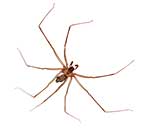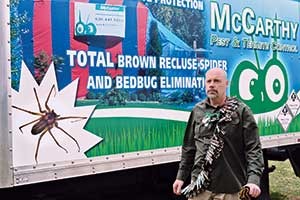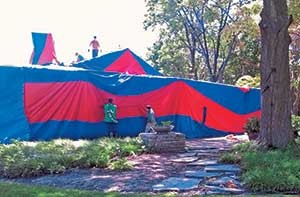Imagine fielding this call: Your prospective customer is The Federal National Mortgage Association, aka Fannie Mae. The lending institution recently took ownership of a $450,000 residence overlooking two holes on a golf course at Whitmoor Country Club in Weldon Spring, Mo., a suburb of St. Louis. The now-vacant, 2,400-sq.-ft. ranch has an itsy-bitsy spider problem: It’s been overrun by thousands of venomous brown recluse spiders. Would you be up for the job? Tim McCarthy was. Here’s his story.
“This spider job required nine tarps and 40 hours of fumigating,” says McCarthy, a third-generation pest management professional (PMP) and president of McCarthy Pest Control, based in St. Charles, Mo. “All-in-all — including tarping, fumigating and airing out — this spider job took four days, but we grossed nearly $15,000.”
McCarthy Pest Control used a gas fumigant with the active ingredient sulfuryl fluoride. McCarthy credits Sean Brantley — a PMP who runs the fumigation division of Emory Brantley & Sons Termite and Pest Control in Pinellas Park, Fla. — for mentoring him on fumigating structures.
“Sean was an instructor at a fumigation course I attended at the University of Florida,” McCarthy says. “I met with Sean after completing the course, and he unselfishly shared his time and fumigation tips.
“Many PMPs use fumigation to control termites, but I saw a tremendous opportunity to leverage the technology to eliminate brown recluse spiders,” McCarthy adds. “We’re basically ground zero for brown recluse spider infestations. Every year, we field a few hundred such calls.”
Recently, a woman called McCarthy after her husband caught a spider in their home. The couple wanted McCarthy to identify the species. Sure enough, it was a brown recluse spider. The telltale sign: the fiddle-design on the arachnid’s back.
“I left a few glue boards to monitor the situation and trapped nine more brown recluse spiders within a day or two,” McCarthy says. “The couple was distraught. They had just moved into the home a month ago … and they have a five-month-old baby.
“Unfortunately, in our neck of the woods, we hear this story often,” McCarthy adds. “Thankfully, there’s a solution for complete elimination.”
Brown recluse spider bites can be lethal, but as McCarthy says, “Typically, they’re not lethal. Usually, brown-recluse spider bites just make you wish you were dead.”
You can reach Pest Management Professional Publisher and Editorial Director Marty Whitford at mwhitford@northcoastmedia.net.



Leave A Comment